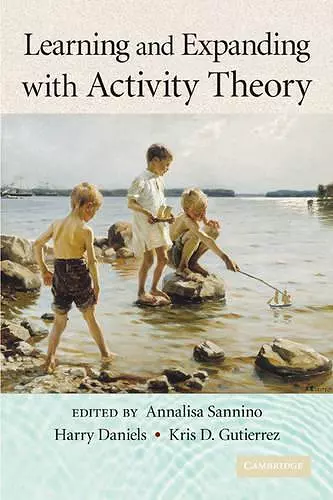Learning and Expanding with Activity Theory
Harry Daniels editor Annalisa Sannino editor Kris D Gutiérrez editor
Format:Paperback
Publisher:Cambridge University Press
Published:17th Aug '09
Currently unavailable, and unfortunately no date known when it will be back
This paperback is available in another edition too:
- Hardback£67.00(9780521760751)

This book provides researchers with an accessible text that also supports the use of the classic tradition of activity theory.
This book is a collection about cultural-historical activity theory as it has been developed and applied by Yrjö Engeström. The work of Engeström is both rooted in the legacy of Vygotsky and Leont'ev and focuses on current research concerns that are related to learning and development in work practices. His publications cross various disciplines and develop intermediate theoretical tools to deal with empirical questions. In this volume, Engeström's work is used as a springboard to reflect on the question of the use, appropriation, and further development of the classic heritage within activity theory. The book is structured as a discussion among senior scholars, including Y. Engeström himself. The work of the authors pushes on classical activity theory to address pressing issues and critical contradictions in local practices and larger social systems.
“This is a fine collection of papers on activity theory produced by internationally renowned scholars. The book provides a comprehensive overview of one of the most important focal points of activity theory, namely the relationship between theory and practice. It offers valuable insights from many perspectives and discusses the many issues that derive from grappling with this relationship. I would not hesitate to recommend this book to students, colleagues, and practitioners.” – Bente Elkjaer, University of Aarhus, Denmark
“A superb collection of varied, important research focused on the possibilities for transforming human cognition, institutions, schools, workplaces and communities. This provocative work is grounded within the frameworks for the analysis of how ongoing practice within consequential activity transforms human social life developed by one of our most important contemporary social theorists: Yrjö Engeström. It offers a powerful alternative to views of cognition that focus on the individual, to our contemporary ways of theorizing learning and education, and a wonderful place to enter an important dialog on how humans as social creatures transform the social, cognitive and material worlds they inhabit through practice, a dialog that began with the work of Vygotsky, Luria and Leont’ev.” – Charles Goodwin, University of California at Los Angeles
“A celebratory yet probing consideration of the work of one the best known cultural-historical activity theorists in the world, Yrjö Engeström, this edited volume sets a direction for debates in the field. At the same time, it extends Engeström’s analytic uses of activity theory as reflexive means for changing work practices. The editors skillfully highlight decisive points of theoretical progress and of practical advance.” – Dorothy Holland, University of North Carolina at Chapel Hill
“Humanity develops primarily through cultural evolution, the ultra-fast process by which knowledge and tools are accumulated and handed over from generation to generation. One of the most important mechanisms of this process is the constitution and development of activity systems that organize people's actions in relation to shared objects. This book is a homage to Yrjö Engeström, the leading theoretician of learning as a vehicle of, and a vehicle for, cultural evolution. It is written by his best and closest intellectual partners. In the world according to Engeström, people transform themselves by transforming the activity systems which their acts are a part of. You may or may not subscribe to such a deeply materialistic view, but without finding out what happens at one of its hottest frontiers, the field of contemporary research on learning will remain closed to you. This book is actually your key to it.” – Ference Marton, University of Gothenburg, Sweden
ISBN: 9780521758109
Dimensions: 226mm x 152mm x 18mm
Weight: 520g
390 pages